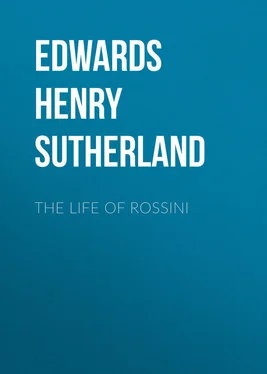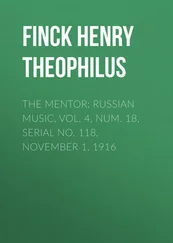Henry Edwards - The Life of Rossini
Здесь есть возможность читать онлайн «Henry Edwards - The Life of Rossini» — ознакомительный отрывок электронной книги совершенно бесплатно, а после прочтения отрывка купить полную версию. В некоторых случаях можно слушать аудио, скачать через торрент в формате fb2 и присутствует краткое содержание. Жанр: foreign_antique, foreign_prose, на английском языке. Описание произведения, (предисловие) а так же отзывы посетителей доступны на портале библиотеки ЛибКат.
- Название:The Life of Rossini
- Автор:
- Жанр:
- Год:неизвестен
- ISBN:нет данных
- Рейтинг книги:4 / 5. Голосов: 1
-
Избранное:Добавить в избранное
- Отзывы:
-
Ваша оценка:
- 80
- 1
- 2
- 3
- 4
- 5
The Life of Rossini: краткое содержание, описание и аннотация
Предлагаем к чтению аннотацию, описание, краткое содержание или предисловие (зависит от того, что написал сам автор книги «The Life of Rossini»). Если вы не нашли необходимую информацию о книге — напишите в комментариях, мы постараемся отыскать её.
The Life of Rossini — читать онлайн ознакомительный отрывок
Ниже представлен текст книги, разбитый по страницам. Система сохранения места последней прочитанной страницы, позволяет с удобством читать онлайн бесплатно книгу «The Life of Rossini», без необходимости каждый раз заново искать на чём Вы остановились. Поставьте закладку, и сможете в любой момент перейти на страницу, на которой закончили чтение.
Интервал:
Закладка:
The fact is, Rossini rendered both styles more natural, more like life, as far as life can be represented in opera, and certainly more dramatic.
In “L’Italiana in Algeri” we see only the first essay in the style which was to be brought to perfection in “Il Barbiere” and “Cenerentola;” but “L’Italiana” was the forerunner of these works, just as “Tancredi,” in the serious style, was the forerunner of “Otello” and “Semiramide.”
“L’Italiana in Algeri,” like “Tancredi,” was composed for Venice; this time neither for the San Mosè nor the Fenice, but for the San Benedetto. The principal part was written for Madame Marcolini, who again, as in “L’Equivoco Stravagante,” and “La Pietra del Paragone,” was provided with a brilliant rondo finale.
In the concerted finale of the first act the prolonged crescendo was found as effective as the same device had proved in “Tancredi.” Rossini had now adopted his crescendo, never to forsake it; and if he was faithful to it, it certainly was faithful to him, and never once deceived him.
The recitatives in “L’Italiana in Algeri,” as in “Tancredi,” are still rather long. The dramatic progress, too, in “L’Italiana” is slow, and the acts, as in all Rossini’s two-act operas – that is to say, all his important Italian operas, with the exception of “Otello” – last a prodigious time.
It must be remembered that when these operas were written it was the custom in Italy to give a divertissement, or even a long ballet, between the acts. As to the lengthiness of the recitatives, that was an affair of very little importance. No one was obliged to listen to them, and private conversation took place between the pieces, as public dancing took place between the acts.
Not only recitatives, but inferior airs, were neglected in this manner. If Tancredi’s air was called “Aria dei rizzi,” because it was composed while rice was being cooked, Berta’s air in “Il Barbiere” got to be known as the “Aria di sorbetto,” because people used to eat ices while it was being sung.
Rossini, no doubt, effected a reform in the conduct of his audiences as well in that of his dramas. The public were quite right not to listen to interminable recitatives; and when Rossini shortened his, and gave them a more dramatic character, at the same time increasing the number and variety of musical pieces in each act, he soon gained the full attention of his audience; after which, one excuse at least for being tedious had disappeared.
The worst of it was that, almost as soon as Rossini had brought the Italian public to listen to his operas from beginning to end, he ceased to write. “Il Barbiere” was composed in 1816, and he never gave Italy a note after “Semiramide” in 1823.
The moment has now arrived for recording an anecdote. It is not pleasant to tell it for the five hundredth time; but a place for the most celebrated of all the Rossini anecdotes must somewhere be found, and it belongs to the year 1813, of which we take leave with the present chapter.
It was in the eventful year, then, of 1813 – the year of “Il Figlio per Azzardo,” with its obbligato accompaniment for lamp-shades, of “Tancredi,” and of “L’Italiana in Algeri” – that Rossini was writing one morning in bed, when the duet on which he was engaged fell from his hands.
“Nothing easier,” an ordinary composer would say, “than to pick it up again.”
“Nothing easier,” said Rossini, “than to write a new one in its place.”
Rossini would not get out of bed for a mere duet. He set to work and composed another, which did not resemble the original one in the least.
A friend called. “I have just dropped a duet,” said Rossini, “I wish you would get it for me. You will find it somewhere under the bed.”
The friend felt for the duet with his cane, fished it out, and handed it to the composer.
“Now which do you like best?” asked Rossini; “I have written two.”
He sang them both. The friend thought the character of the first was most in keeping with the dramatic situation. Rossini was of the same opinion, and decided to turn the second duet into a trio.
He finished his trio, got up, dressed, sent the two pieces to the theatrical copyist, and went out to breakfast.
This anecdote is often told in illustration of Rossini’s laziness, as if a really active man would have got out of bed to pick up the fallen duet rather than set to work, lazily , to compose a new one.
Many volumes might be written on this question. It will be sufficient, however, to point out that activity is mere liveliness of the body, as liveliness is activity of the mind. So laziness is dulness of the body, dulness laziness of the mind. Rossini had a lively mind in a lazy body. He could not have walked a thousand miles in a thousand hours; but he wrote the “Barber of Seville” in thirteen days.
CHAPTER VII
ROSSINI’S REFORMS IN WRITING FOR THE VOICE
ROSSINI encountered no serious obstacles in his career. He was never crossed in love like Beethoven – indeed, in his numerous affairs of the heart, he seems always to have been met half way; nor did his works ever remain unappreciated for more than about twenty-four hours at a time.
He was never lamentably poor, like Schubert; for though in the earlier part of his career he was badly paid, he could always earn twenty or thirty pounds, the price of an opera, by working for two or three weeks.
To tell the truth, he seems never to have been depressed or elevated by the aspirations of Mozart; and he had (to use a favourite word of his) the same “facility” in succeeding that he invariably manifested in producing.
He attacked no subject that he did not make something of. If, as occasionally happened, an opera of his fell to the ground, he literally picked up the pieces and turned the best of them to account in building up and adorning some new work. This great artist and practical philosopher had already, as we know, written a “Cyrus in Babylon” for Ferrara, when he was called upon to produce an “Aurelian in Palmyra” at Milan.
“Ciro in Babilonia,” though it contained some very beautiful pieces, had not, as a whole, been particularly successful; and Rossini probably thought that in its oratorio form it was not likely to be repeated. At all events, he extracted from it a magnificent chorus for his “Aureliano;” to be thence transplanted in another shape – when “Aureliano” in its turn had failed – to the “Barber of Seville.” He also wrote for “Aureliano” an admirable overture, which a year afterwards was taken to Naples to serve as introduction to “Elisabetta,” and the year after that (“Elisabetta” having perished) to Rome, where it got prefixed to the immortal “Barber” – from whom may it never be separated!
Beethoven, for one opera, composed three overtures. Rossini made one overture serve for three operas; and it is remarkable that of these, two were serious, the third eminently comic.
Rossini’s life, as has just been observed, presents no dramatic interest. Such interest as it does possess belongs entirely to the composer’s artistic career, and consists in the reforms that he introduced into operatic art.
After “Tancredi,” in which we notice Rossini’s first innovations in opera seria, and “L’Italiana in Algeri,” which holds a corresponding place in the history of his comic operas, came “Aureliano in Palmira,” which marks another step in advance, not, as in the two previous instances, by reason of its success, but through failure.
In “Aureliano,” Rossini had written a part for the celebrated sopranist, Velluti (“non vir sed veluti”). Rossini did not like Velluti’s singing, and Velluti did not like Rossini’s music; or, at least, did not like the composer’s objecting to his music being so disfigured under the pretext of embellishment as to be rendered absolutely unrecognisable.
Читать дальшеИнтервал:
Закладка:
Похожие книги на «The Life of Rossini»
Представляем Вашему вниманию похожие книги на «The Life of Rossini» списком для выбора. Мы отобрали схожую по названию и смыслу литературу в надежде предоставить читателям больше вариантов отыскать новые, интересные, ещё непрочитанные произведения.
Обсуждение, отзывы о книге «The Life of Rossini» и просто собственные мнения читателей. Оставьте ваши комментарии, напишите, что Вы думаете о произведении, его смысле или главных героях. Укажите что конкретно понравилось, а что нет, и почему Вы так считаете.












